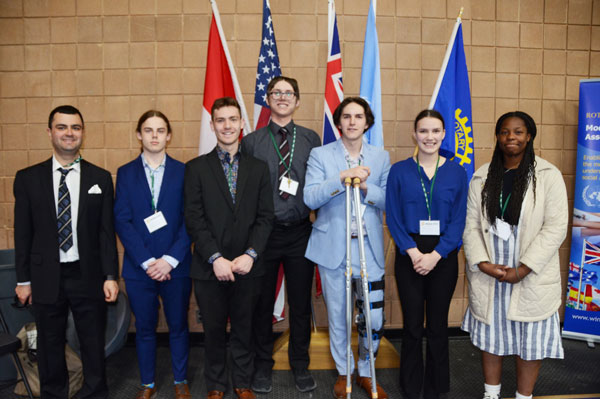
In early May, students from Ecole St. Mary High School traveled to Winnipeg to take part in the Rotary Club of Winnipeg Model United Nations Assembly.
Three delegations of two students travelled to the event with the St. Mary team of Andrew Harris and Rylee McKay, who took part as delegates from South Korea, placing in the Top 5 and bringing home an honourable mention from the Assembly.
The event included 80 delegations from across Western Canada. Harris said he enjoyed the opportunity.
“It was a very good experience (and) lots of fun … to be in such a big room and a big group with so many other delegates who were very formal and professional, just like the real United Nations would be,” he said. “I really liked the whole way they set it up. It was just very well done.”
Along with coach Remi Joncas, students Harris, McKay, Eden Tourney, Thulisa Egbeyemi, Caber Dawson and Carter Minier attended.
During debates, each member of the pair spoke on a different subject. One member spoke on global security, while the other debated climate change. The Winnipeg United Nations Assembly had 80 delegations compared to 20 in the Prince Albert version, and that made it harder to get noticed.
“I think it was harder to have a voice in this one because when there’s 20 teams you can talk so much more,” McKay said. “Then in this one you were almost overshadowed, I want to say, by some of the other teams (and) not in a negative way necessarily.”
Despite the challenges, Harris and McKay were able to secure an honourable mention. Harris credited their knowledge of how the UN worked for the success.
“We had done a bunch of research on all the procedural stuff, and we knew our country very well,” he said. “When we did get our chances to speak, I thought we really made good on them and we made some good points. As well, what really helped us is we were able to correct the procedure a couple of times.”
One example was the person who called on delegates called on Belarus twice when they are only allowed to be called on once per assembly and Harris called it out through a point of order.
The event was at the Canadian Mennonite University in Winnipeg. Students stayed overnight in the dorms for three nights, then headed off to the campus’ gym where the Model UN held meetings.
“We kind of stayed together for like lunch and suppers and stuff, so it’s good team building,” Harris said.
St. Mary student Eden Tourney was one of two Prince Albert delegates who represented South Africa at the event. She said they had to stay in character when they were outside their rooms, which added to the experience.
“It is a cool atmosphere to (have) all the delegation staying there and then eating late in the day,” Tourney said.
Most of the delegations who took part were made up of Grade 12 students. St. Mary student Thulisa Egbeyemi is an exception. The Grade 10 student took part as a delegate from the Republic of Vanuatu. She loved taking part, even if it was a bit challenging at first.
“I was kind of scared to be with the Grade 12s and intimidated, kind of,” she said. “As the days went on, (I became) a lot more comfortable because they are a nice group of people.”
All students credited their experience with the smaller regional Model UN in Prince Albert for helping them in Winnipeg. McKay said travelling to Winnipeg made them grateful for what they had back home.
“It also showed the quality of our assembly, how good of quality it already is,” McKay said. “Winnipeg is a step up, but it’s it doesn’t make PA seem poor quality by any means.”
Tourney said that the Prince Albert version is well organized, which also benefited the delegates who travelled to Winnipeg. Harris explained the Prince Albert Model UN also gave them a structural advantage.
“With the Prince Albert one we do, there’s a lot more room for debate because there are less delegations,” Harris said. “The format was just structured in a way that it allowed for a lot more debate and speaking which I really like personally, whereas in Winnipeg, it was really good (and) we still got to debate, just not as much. It’s just a different approach to it.”
“I think are our teams, just because of that experience (in Prince Albert), did have very strong debate skills,” McKay added. “We knew what points to make at what time, so when it came to the smaller debate times in Winnipeg, I think we were very strong in those areas.”
Tourney said the other schools treated debate as their main focus. The St. Mary delegations had prior experience with it at the regional level, so they tried to focus on other areas.
“We have to (have) procedure down already, know what to say and when and formalities, speaking,” Tourney said. “We knew how to address everybody and how to address ourselves and we just went in with the advantage because some schools I don’t think were as familiar as we were.”
McKay gave credit to their teacher for creating this opportunity.
“I think we should give a shout out to Mr. Joncas for having taught us so well because we did have a very good understanding of the rules and procedure. Like Andrew was saying earlier, when it comes to model UN assemblies, all of the schools had some kind of understanding, but I really felt like ours was very strong.”
michael.oleskyn@paherald.sk.ca

